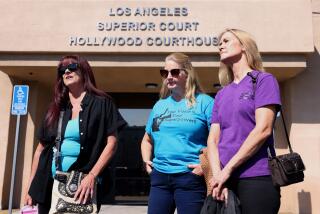Judge Notes Vastness of Jury Pool, Rejects Stalker Case Venue Change
- Share via
Citing the massive pool of potential jurors in Los Angeles County, a Superior Court judge Friday rejected a motion by attorneys for Richard Ramirez to transfer the accused Night Stalker’s trial to elsewhere in the state due to adverse publicity.
“This county is so large and the people here are so sophisticated and so diverse that I just don’t think you can say that you can’t have a fair trial in this county,” said Judge Dion G. Morrow, after conceding that he had agonized over the decision.
“Obviously this is as grave and serious a case as has been filed in this or any other state . . . (and) the publicity level would tend to indicate, I would say, that it would be difficult to obtain a fair trial in this county,” Morrow noted, “. . . (but) this is the largest community, I think, of any single court system in the country.”
Summer Start Predicted
Morrow’s ruling came on the thirteenth day of hearings during a three-month period on the change of venue motion filed by Ramirez’s attorneys, Daniel Hernandez and Arturo Hernandez. As a result, Ramirez’s trial, which both sides predict will probably begin during the summer, is now scheduled to be held a couple of hundred feet down the hallway from Morrow, in the courtroom of Judge Michael Tynan.
Ramirez, a 26-year-old drifter from El Paso, is charged with 14 murders and 31 other felonies stemming from a random crime spree in 1985.
In his final statement to the judge, Arturo Hernandez contended that the randomness of the attacks and the widespread recognition that Ramirez has received since his August, 1985, arrest have created a reasonable likelihood that he can not receive a fair trial in Los Angeles.
‘Regular’ People
“The victims in our case are regular elderly folks, retired people, working people, very young people, children who were allegedly assaulted--people in their homes in middle-class suburbia were being attacked,” Hernandez said.
Hernandez, who said he will seek to reverse Morrow’s ruling before the state Court of Appeal, also argued that no matter how hard they try, potential jurors are unlikely to be able to set aside their preconceptions about Ramirez.
“If I were in my own home and I could not sleep because I am afraid that the Night Stalker might walk in, then I think that the issue of embeddedness in the consciousness of the community is substantial,” he said.
Newspaper Clippings
The defense lawyers, who are not related, submitted hefty packets of news clippings to Morrow and played lengthy videotapes of television news coverage of the case. The pair also presented a random telephone survey prepared by a San Diego State University political scientist indicating that 94.3% of 300 people questioned had heard of the Ramirez case and 51.7% felt that Ramirez was responsible for the Night Stalker killings.
Morrow, however, asserted that such data “means hardly anything,” since “the evidence that tends to show guilt always comes out first . . . and that’s the way the system works.”
Deputy Dist. Atty. Sterling E. Norris, who argued that the glare of publicity would be even greater if the case were transferred to a smaller community, termed Morrow’s action “a very good decision.”
According to Morrow, only one case has ever been transferred out of Los Angeles County--a 1969 political corruption trial involving a Los Angeles commissioner.
Ramirez appeared to take the ruling in stride, grinning at several women supporters as he was led in chains from the courtroom.
More to Read
Sign up for Essential California
The most important California stories and recommendations in your inbox every morning.
You may occasionally receive promotional content from the Los Angeles Times.













